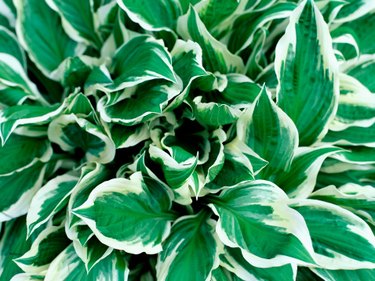Things You'll Need
Rake
Shears
Mulch

Hostas are one of the most popular perennial plants grown in American gardens, and with good reason. Their glossy green foliage is visually appealing, and they rarely pose trouble for the home gardener. Although hostas require little maintenance, they are sometimes susceptible to certain pests and disease. During the fall, take some precautionary measures to protect your hosta plants from attack and to keep them thriving. Your autumn chore list will not take long, and it will ensure healthy hostas for the spring.
Step 1
Remove all flowers after they bloom. Cut off the flowers and their stalks down to the hosta's crown, recommends the University of Minnesota. This will save the plant from expending energy on the flowers; hostas, like other plants, need to save energy as winter approaches.
Video of the Day
Step 2
Remove all leaves and stems that are infected by viral, fungal or bacterial disease. Infected leaves may turn yellow, have rust, orange or black-colored spots, be shriveled or appear burnt. Orange fungal spheres may be present on stems, or stems may appear rotten. Eliminate all infected foliage right away to prevent spread.
Step 3
Rake up all autumn leaves and debris away from the base of your hosta plants as slugs, a common hosta pest, thrive in these environments, says North Dakota State University Extension. You can also cut back frost-damaged leaves -- or all leaves -- after the first frost, and remove them, to eliminate winter habitat for slugs.
Step 4
Apply a layer of mulch to your hosta plant bed for winter protection. The University of Minnesota Extension recommends waiting until the ground is already frozen to approximately 3 inches before applying the mulch.
Video of the Day